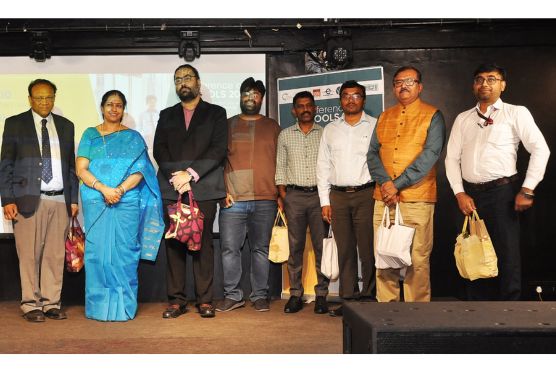Why is it important for students to learn about sustainability in schools; Finally answered


The Conference of Schools (COS) 2023 brought together young people from Kolkata and Sunderbans to voice their concerns, ideas and solutions about climate change mitigation and adaptation to decision-makers of the city. This event was an opportunity for students aged 13-17 (Class 8-12) currently enrolled in academic institutions to showcase their problem solving skills and a chance to interact with key decision-makers and industry experts on sustainability. The Conference was attended by 26 schools across Kolkata and the Sunderbans, represented by 54 students at Offbeat CCU, Kolkata.
The theme for COS 2023 was "Mitigation and Adaptation Solutions proposed by Youth to Climate Change Challenges in Kolkata and Sunderbans." The topics of focus at the Conference included Urban greenery, Blue Infrastructure (waterbodies, lake systems, wetlands and rivers), Traffic Congestion, Air Pollution, Waste (Upcycling, Recycling, Management, Segregation), Sustainable Mobility (Electric Vehicles, Non Motorised Transport), Survival of Sundarbans, and Natural Disasters. Students presented their insights and solutions in English, Hindi or Bengali. The Telegraph Online Edugraph recently got into a candid conversation with Pauline Laravoire to know more about the issue in detail.
PL- There are many career opportunities students can look forward to within the scope of what we call the green or ecological economy, sometimes also most broadly referred to as the positive or regenerative economy. This scope spans from engineering or managerial pathways in the renewable energy sector; to working in academia or educational management towards education for sustainability (which is my own career path); to choosing to join a corporation with strong ESG and CSR policies; to becoming an impact entrepreneur and building a company that cares about it's triple bottom line (People, Planet, Profit); to taking up a lobbying or political career. The possibilities are really endless and it's up to each of us to find the best role we can play on the sustainability chessboard, based on our values, interests and core competencies. I have actually developed a career tool called SDGs-SDFs- SDEs (Sustainable Development Goals, Fields and Enablers) to help individuals find their own personalised path.

2. What according to you are a few of the most suitable jobs that students can get if they look forward to build a career in sustainable departments?
PL- Sustainability is both a set of skills (hard and soft), and a mindset. Embedding sustainability into our curricula from school onwards, even from preschool onwards, is a crucial step towards involving all generations in solving some of the most complex social, environmental and societal challenges our planet has ever faced - which we usually refer to as the triple crisis: climate, biodiversity and inequality. These are also relevantly portrayed through the 17 Sustainable Development Goals.
It is therefore essential for school students to first develop an in-depth understanding of these complex and interdependent challenges (ability to grasp complexity), and then to develop an understanding of the gravity of the situation and the role that stakeholders (including themselves) can play to rebalance this world. And lastly, to develop the skills, and most importantly the courage, to take action through their personal and professional choices.
The day concluded with the synthesised presentations being delivered to key government stakeholders such as Shri Rajanvir Singh Kapoor (IAS), MD WBTC, Shri Kaliyamurthi Balamurugan, Chief Environment Officer, Dept. of Environment, GoWB, Shri Atul Prakash, Principal Director, RTI, IA & AD, Govt. of India, Kolkata, Col. Indrajit Roy, General Manager, New Town Business Club, Shri Santanu Patra, Superintending Engineer, C-III, R&B Sector, KMDA, Shri Ujjal Bose, Sr. Audit Officer, RTI, IA & AD, Govt. of India, Kolkata along with industry experts such as Mrs. Manoshi Roy Chowdhury, Co-Chairperson, Techno India Group, Mr. Pradip Chopra, Chairman, PS Group, Mr. Nandan Mall, Founder and CMD, Hulladek. It also featured an awards ceremony for the top three school delegations who received opportunities to be mentored by various experts on sustainability, to implement their ideas.